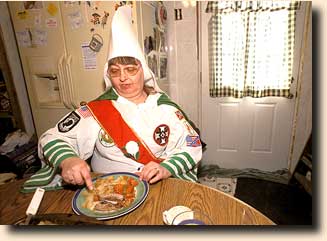|
Part twoAbout my second Klan visit after a couple of weeks in the South where I had talks with Morris Dees about the Klan in the Southern Poverty Law Center:
Back up in the cold North I had to wait a couple of days before the video equipment arrived to Bluffton University, which was the closest contact I had to the Klan headquarters. Then I drove back to a warm reunion with Pamela. I cannot here reveal everything I found out – first of all because I have not yet had time to listen to the tapes and go through the enormous material. Let me just sketch out the goals I wanted to achieve.
2. Furthermore, I was interested in exploring the deeper layers of their personality to find out if they indeed held anything that could be characterized as hatred. Overall, I wanted to find out what hate is, since this topic is a very important part of the interactive DVD on racism I am working on for educators. 3. And finally, it was to find out about the circumstances, which had put Jeffery in prison, since there seemed to be a silent unspoken kind of conspiracy around this between Morris Dees and the Klan.
The Klan leader¹s story was the worst. His mother was a drug addict and prostitute, and she had either grossly neglected him leaving him unattended for days - or made him witness her dealings with her mostly black customers. The first image he formed of blacks was somebody who always came to take his mother away from him. Who would not have developed some form of racism from such an experience? Probably even more important was his later upbringing
by a violent, alcoholic stepfather, who frequently beat up he and his
mother so badly that none of the furnishing was intact in their
trailor. After one such violent experience when he was 12, he took
revenge and tied his stepfather to his bed, beat him up and fled. For
the next eight years he was homeless, slept under bridges, etc., and
lived from hustling and petty crime and car theft until he was 20,
when he first joined a biker group and later the Klan. I have
experienced similar patterns all too often in the black ghetto and
among those who joined the black panthers. So how could I not help but
feel at home in the company of the Klan? Pamela and many of the others had also first been bikers, which had given them pride and a form of compensation for the missing love in their upbringing through tattoos and insignias and letting their motorbike rip at full throttle. From there it was not a long step to try to get even more attention by dressing up in Klan costumes. For that was about all there was to it. They had no reason whatsoever to play angels for me, but I simply did not find any foundation to call them hateful - neither in their statements nor, more importantly, in their hearts. None of them seemed to have the slightest against blacks, Jews or Muslims ("Muslims are good God-fearing people"), and many of them had individual black and even Jewish friends.
One of Pamela's greatest sorrows in life had been to lose her best and very close black friend of many years when the friend discovered that through all those years Pamela had been in the Ku Klux Klan. She seemed simply unable to grasp why this fact should have ruined their deep friendship. And Jeffery’s son, who is very active in the Klan, is even more active in a rap band with blacks. None of them see any inconsistencies in this. One of the most interesting aspects is that the stepfather of the Klan leader, Jeffery, is black and that he deeply loves and respects his stepfather. Why? Well, probably he started out as one of his mother’s old customers, but he happened to fall in love with her and through his love "saved her out of a life in sin as a drug addict and prostitute and had made her into a fine lady," as Jeffrey tells it years after he fled his first violent stepfather.
In general, Jeffery is the kind of person who quickly makes friends with anyone - or falls out with them - without regard to their background. The Klan rhetoric, as mentioned, is just something he uses during demonstrations in order to get the attention of the media. It is completely parallel to how the radical left or the black panthers used to shout "smash capitalism" and "kill the pigs" without ever talking like this in private or really believing in the words. I personally have had countless well-educated friends who once shouted in such an offensive way about killing policemen, who today sit in high jobs and positions. However, even at cross-burning rallies, I never heard the almost entirely low-educated Klan people in such a direct way shout about killing black people. I am sure they were capable of doing it in the past, when the public opinion to a larger degree gave such attitudes moral support -- particularly in the South -- just as the political climate in the Sixties sanctioned the leftist rhetoric. The only people who everybody in Jeffery’s group had difficulties accepting were homosexuals, and that they all explained with "The Bible says that it is wrong." Although I had serious doubts whether any of them had actually read the Bible, for me it was more important to find out what they "felt" in their hearts for homosexuals. I was pleasantly surprised. For when I asked the question in a slightly different way: "What would you say if your own son was gay?" they all answered without exception: "Of course I would love him like any of my other children." I know that many ordinary Americans outside the so-called "hate groups" would have otherwise answered this question in a directly hateful and condemning way. In fact, although the Klan members in most of their views were completely in line with average Republicans, they were actually far out on the left in some areas. They were all fanatic opponents of capital punishment, for example (but as a direct consequence of this belonged to the far right in the question of abortion), since, as they said, "It simply is wrong to take any human life." No, I did not find hate in the Ku Klux Klan! So how
did they explain their affiliation with it? Uneducated as they all
were, it was difficult for them to verbalize this, and they mostly
repeated the words of their leader, which I had already heard in the
TV-program. That is, that there should be "equal rights for all and
special rights for none."
Nevertheless, they only used the "White Power" greeting on their answering machine and in their public demonstrations - again to attract our negative attention. Moreover, Pamela felt directly ashamed because her 4-year old grandchild had learned it partly from the parrots and partly from the son in law, whom they all looked down upon as an incorrigible former neo-Nazi. In other words, it was evident that what they did not like about this person, Walter, was precisely that he had hate in him. Not so much because it threatened the negative image of the Klan - which they thrived upon, to be sure - but because it threatened their own view of themselves as decent people. Even the Klan leader warned me later against "Wally," whom he called "nothing but a scumbag." However, there was nothing he could do about it, since Wally had come into the Klan by marrying Tania, his own daughter.
What irritated him most was the fact that Wally while he himself was in prison had taken over the Klan’s weekly radio broadcast and now used it to spew hate. Later Wally showed me some of the video tapes of their broadcasts in which they had appeared together. It struck me how Jeffery was constantly on guard with damage control whenever his son in law said something that was hateful in Jeffery’s ears and thus belittled him with his vision of being a Martin Luther King for his people. Wally was also the only one I felt a little scared by
myself - although we quickly became friends and I ended up liking him,
in fact, in spite of his decidedly "evil" aura. Just take a quick look
at my web pictures of
While I could identify myself right away with all the other Klan members and understand the nearly logical development that their lives had taken after their ghastly childhood experiences, Wally confused me. He was smart enough to lead me a dance. The reason he made me a little scared was that I could not find any obvious injuries in his childhood from an integrated neighborhood in Manhattan, and thus could not find the hurt child in him, which was so easy to find, to relate to, and to defend in all the others. When I probed deeper into his story, a terrifying truth about him appeared one day, which at least explained much of his bitterness and hurt. He had been happily married in New York and loved his wife and their 3-year old daughter, but suddenly one day they both were killed - right in front of his own eyes in their car - hit by stray bullets from one of the black gang fights in the street. After this, he had been in a kind of mental coma for a couple of years and then had turned into a Nazi. One day he saw Tania and her father appear in Klan hoods on the Jerry Springer TV-show and had fallen in love with her and gone to a Klan meeting in North Carolina to propose to her.
Nobody could have any doubt that these two "fat and ugly people" (again in the eyes of those of us better off who harbor class hatred against the manifestations of poverty) loved each other more than anything on earth. They sat holding hands incessantly with their swastika-tattooed arms. But if there was anyone they loved above it all, it was their daughter, who Wally cared for and played with day and night this was the reason I had a hard time getting his attention until far into night when he had put her to bed. While Tania worked at the gas station, Wally had decided to be a homebound father in order to devote every moment to their beloved daughter and because he was in an agony of fear of losing her like he had lost his first daughter. Within the confinement of their impoverished walls, he could conduct ideological warfare against the entire world and sound menacing through a rhetoric that seeks and finds our hatred and condemnation. Yet - as both the Klan leader and his wife told me and I myself soon realized - he was in fact not capable of hurting a hair on any living being. "He is all bark and no bite," Jeff said, when I worried about Wally possibly taking over the leadership of the Klan while Jeff was in prison. I would not hesitate myself - like Swedish playwright Lars Norén (who put a group of imprisoned Nazis on stage in his play in Stockholm) - to put Wally on a theatrical stage, although he with his dead eye and bald head would probably frighten most spectators and thus actually put the outside world’s own hatred on display.
Theoretically speaking he brings up his daughter to hate to lift the arm in a Heil-signal and to say "white power." But when this is done along with the hundreds of normal loving children’s books he spends most of his time reading aloud for her all day long, I am in fact not worried that she would grow up with hatred in her heart. For real hate is not the product of self-sacrificing love and devotion but of deep pain and mistreatment. Yet no matter how close we became, I never gained enough of Wally’s trust to spend the night with his family. He did not trust any human being, had no friends and hardly ever ventured outside. For me, with my usual ability to gain anybody’s trust, this was an admission of failure. But since he knew my book and my work, you could not really blame him for not trusting me. He allowed me nonetheless to photograph and videotape him from morning to night even in the most intimate situations with his child and his wife.
When I had managed to get the friendship of the only person whom the Klan members themselves felt was a bit "dangerous" and "hateful," I came to the greatest of all challenges the attempt to get into the prison to see the Klan leader, Jeffery. All the members had told me that I might as well give up on that. None of them had managed to get visitation permits, not even the two children. Only his wife Pamela had succeeded after some months to get one. People in Denmark simply have no idea how Americans brutalize inmates and their families in US prisons. One has to send written applications, which have to be approved by an enormous bureaucracy as well as the inmate himself. Yet it took me only half a day. Still you can easily give up when you stand in front of these enormous towering castles or entire cities, which American prisons often appear with their sometimes 5000 incarcerated, placed in the middle of nowhere and usually far away from their loved ones who are so important for any successful rehabilitation. In the end, my book was probably what helped me most to convince the authorities that I was not a Klan sympathizer. The security precautions were, if anything, even more extensive than I am used to when I visit my many black friends in prison. Thus I had to negotiate directly with people in the leadership, for if any rumor reached a prison guard or inmate that Jeffery was a Ku Klux Klan leader, everyone knew that he would be a dead man among the great majority of blacks he was in prison with. Unfortunately I had all my cameras, videocam and even my belt and nail scissors taken from me, but was given a notebook and a pen. I was even given permission to see him outside normal visiting hours so we could sit alone in a huge room. It was a shock for me to see the fearful look in his eyes and the now haggard face on this proud longhaired and bearded Klan leader I had seen on TV. He seemed a little uncomfortable getting a big hug from me, who was his adversary in so many ways but who now represented his only hope for freedom. Pamela had told him everything about me over the telephone. I knew our time was short and went straight to the matter about his childhood, which did not surprise him, since again he knew everything from Pamela about how I had interviewed all of them. As mentioned earlier, his childhood had been indescribably evil. He told me about it with photographically sharp details. Only in one place did I have the feeling that he romanticized after the event and I therefore kept asking repeatedly about geographic details to find holes in his story. One night when he was five years old, he was sitting in a car with his younger sister outside the house of one of his mother’s black customers when some Klan people in white robes approached with guns, probably in order to - as what quite common in those days - scare this "nigger lover." When they discovered the children in the back seat, he heard one of them shout something like: "Let’s shoot them." But one of the others stopped him with the words: "We can’t. They are white." Jeffery did not say it directly, but he indicated that his Klan activities later in life possibly had something to do with this experience - the experience of the Klan saving his life. When he associates everything negative with "race mixing," there is in any case no doubt that it goes back to his pain and loneliness in those years when his mother lived from prostitution and drugs, mostly surrounding herself with black men. He also talked about the hunger in those years of neglect and, even worse, the hunger during the years he was homeless and went in and out of prison. All this ended when, as a biker, he contacted the notorious Klan leader, David Duke, who was later elected into office in Louisiana. As a bodyguard for Duke, he felt he got some kind of pride, but when he later discovered Duke’s falseness, he turned against him and started his own Klan group. During our entire conversation, I noticed that he never spoke of blacks or other minorities in a derogatory way, but only trashed former Klan friends and all the "nuts" trying to become members. "Eighty-five percent of them are scumbags. I can’t use them. They are niggers." By this point, I was well aware what his and the Klan members’ definition of a "nigger" was: "A low trash person who takes from society and gives nothing back. There are far more white niggers than blacks." Apart from the Nazi, I had in fact never heard the Klansmen use the word "nigger," although I knew they did in demonstrations. And when I finally heard them use the expression, it was always about whites. When I now heard from Jeffery’s own mouth about all the contempt and lack of trust he harbored to the majority of that type of person who felt attracted to the Klan, I suddenly burst out: "So Jeffery, you really hate yourself, isn’t that what it is all about?" He fetched a deep sigh and then said meditatively - again and again: "Yes, I hate myself. I hate myself…… really, really hate myself……" Then I started talking about how I had sensed that he had begun to struggle out of that self-hatred during the year he had been married to Pamela, and this prompted him to tell endlessly about how she was the only real love he had ever had in his life. She meant everything to him and he would give everything in his life to be able to live with her again. At that point, I asked half jokingly if he was even willing to give up the Ku Klux Klan to get her back again. He looked at me as if this was the most self-evident thing in the world and said that now that he had attained everything he had strived for in his whole life - a bit of love - through his work in the Klan (where they had met each other), well, why did he really need the Klan any more, then? "Would you hand over the Wizard-stick to Morris Dees
himself?" I asked boldly. "Also to me?" I laughed, since Pamela had already invited me and my family to join the Klan’s great national congress on July 4. "Of course!" he smiled. It was in that moment the idea began to materialize on how we ought to switch roles - that he should take over "American Pictures" and I should taker over the Ku Klux Klan. He had lived all his life from selling "hate" and I had made a living out of selling "love." Yet I had already long ago realized that neither of us had more of one of these concepts in us than the other had. We had both tired out from the hollowness in our messages, which we were good in each our own way at delivering in the form of empty rhetoric in front of an audience, but messages neither of us had managed to live up to in our daily lives. Immediately when we saw each other on TV, we had both felt a kind of attraction for each other, and now when we finally met, we were ready to switch roles after just a short talk. I sat there in front of him feeling kind of guilty from having always made a good living out of selling him and his equals as symbols of wickedness to my audiences, which were in so many ways craving to cultivate the devil in order to feel a bit morally elevated themselves. I felt guilty because I had continued doing this in spite of the knowledge, I had gained from years of hanging out with ghetto criminals and murderers that there are simply no evil people. Guilty because I now had to realize that by selling him out like this it was me who had been selling hate more than he had. And guilty most of all by realizing how similar we really were. While I sat deeply absorbed in these thoughts, it
suddenly burst out of me: "You are innocent. I know you are here (in
prison) because of your love!" However, while I had been sitting with him there and
felt the energy from him, I was suddenly able to solve the jigsaw
puzzle. One day when I had been interviewing Pamela at home in front
of my video camera, their neighbor had knocked on the door and burst
into the living room without seeing me. He was not a Klan member, just
a good steady neighbor and friend of Jeffery. I didn’t pay attention,
but heard him utter something like "So has he (Jeff) told that stuff
about XXX? Will he be out soon?"
I did not pay attention to the rest of the conversation as I at
that time just sensed that it was nothing but unimportant neighborly
gossip, but I turned the camera toward the man, as I wanted to catch
his pleasant rural face. However, when after some time he left, Pamela
came over to me with a very serious face and asked sternly: Wow, here was another incident of the Klan demanding a reporter’s tape! I really did not feel thus inclined to give up more than one hour of interview with her and so fought tooth and nail to convince her that I had not recorded anything of importance. At last, I was able to calm her down by coming across with completely honest vibrations to her. This means that I was swearing to myself and in my own heart that I would never betray her trust in me. I have never until now had time to listen to all the
tapes, but the next couple of days I caught other small conversations
just as Pamela told me about all the problems she had had with XXX
[Some long sentences have been taken out here, to protect XXX’s
identity.] Now suddenly the pieces in the great puzzle fell into place
for me and I asked Jeffery:
Jeffery was struck with stupefaction, but he felt that he could now trust me. "You are absolutely right. XXX has been terribly angry and out of it ever since I ……..[sentences removed]. He is constantly doing all the wrong things and so much resembles all the anger, I had in myself in my youth when I was a hustler. Yes, it was he who suddenly came busting into the room that day when it happened. But I can’t turn in my own……[……family member]." The only reason I’m here revealing that it is a family member is that Jeffery himself told the court that, as reported in The Evening Star: "In several formal and informal writings to the court since the sentencing, Berry identified a second man as "Mr. White," who is also a member of Berry’s family." Jeffrey told me: "I cannot send him to prison. I am old and have had my time. I can handle these years in prison with the knowledge that I am thereby saving my ……" Wow, I thought to myself, here was indeed a Klan leader, who had given up his entire life, his new found love and the huge Klan empire he tirelessly and laboriously had built up and which was now crumbling away because he had gone to prison. And for what? Not because of his hate, but because of his love! What had happened half a year earlier was - as already mentioned - that two journalists from a TV-station in Louisville had come to interview him. For Europeans who have not been to America I must here add that American TV-news is not set up to be informative like ours. On the contrary they make a living entirely from selling "trash TV" in the form of hate and crime. (As Michael Moore reports in the film documentary, Bowling for Columbine: "While crime went down in America by 30%, crime reporting went up 600%.") So these reporters did not come to Jeffery out of curiosity to find out what he really stood for, where he was coming from and whatever good informative reporting consists of. No, they had arrived with an attitude of hostility toward Jeffery because they only had one thing in mind - to sell hate to their audience. During the interview, Jeffery quickly felt that he did not get his opinions through and finally interrupted it by declaring that he did not want the interview to be broadcast on TV. That is of course his right. I am myself interviewed all the time, but no media would dream of using the material without my approval. Yet the TV-people insisted on airing it, after which he naturally demanded to get the tape. They refused to surrender it, after which he said they could not leave before he got it. For about 5 minutes, the situation was at a deadlock after which Pamela had told XXX outside about it. XXX, who already had a strenuous relationship with Pamela and as usual was overreacting, had a little earlier appeared in his Klan dress for the benefit of the TV-people and had not yet taken it off, suddenly came rushing into the room in his Klan dress carrying a gun. According to Pamela, there had been no direct threats of any kind, just a tense situation. I can easily see that situation from both sides. Knowing the individual Klan members as I now do as nothing but powerless, plain folks of the sometimes rowdy type there is no doubt in my mind that there was absolutely no planned conspiratorial intent in this episode. It was just another angry outburst of the kind I see all the time among the poor. I have long ago learned to see this as the very pathology of institutionalized poverty such as you especially see it in America. Seen from the point of view of the TV-reporters, who came with preconceived ideas of a huge hateful empire - and criminal intent to portray it that way I can easily see them feel intimidated by the very fantasy they had constructed in their own heads. This is parallel to the way white Americans go around with a paranoid view of blacks as "dangerous" and see black criminals everywhere - victimized, as they are by the way commercial media like that same Kentucky TV-station is selling fear of blacks daily. In other words, the conspiracy is on the side of the media against the poor – black or white – not the other way around. By chance another Klan member happened to come by and park his car outside and suddenly it all seemed like a conspiracy in the eyes of those who are making a good living from selling so-called conspiracies. Although I myself parked my car there every day and thus have seen for myself how open it is to all sides, these two journalists depicted this in court to look like they had been prevented from escaping. (See later in the story why I was concerned about the possibility of covering up the house with my own huge car). Yet, as I have understood it, it was not in such a way they first reported it to local police. Here they only presented it all as some kind of harassment. At first, this did not give any reason for prosecution as it was one word against another and nobody had suffered any bodily harm or lost anything. But then Morris Dees, who does a great and important job of monitoring all Klan activities down in Alabama, smelled a rat and convinced the two journalists that they actually - in the 5 minutes it all took - had been subject to "kidnapping." In addition, they had "suffered terribly" under stress while feeling threatened - I am told without having seen the actual court papers. Well, I can testify that it is never nice to see a gun pointed at you as I can tell you from experience of the numerous times it’s happened to me in the black community and a couple of times by white Klan types. Yet I have long ago come to see it as a cry for help. For, at first, it is the gunman who is in real stress - not the one he happens to take out his pain and anger onto. And if one is not prepared to deal with the tremendous pain that we impose on the lower social classes by trying to relate to the human being behind that anger, then why venture into the lives of the poor? Unless - of course - you further want to exploit them and make daily gladiator entertainment of them on trash TV. Well, again, since it was one word against another with no smoking gun, Morris Dees could not get Jeffery sentenced on this testimony alone. He had to make use of all the petty crimes Jeffery was sentenced for in his angry youth as an abused kid and a homeless person. The irony is that he is sentenced because he is a Klan leader - otherwise they would have gone after the person holding the non-smoking-gun and had no reason to construct a ridiculous charge like "conspiracy" for something which obviously occurred in an emotional moment and was in no way "planned" - such as conspiracies are. Yet it was through his Klan activity (whatever we "better-thinking" people in society might think of that) that he was actually able to find his pride and then love, and that gave him the capability to struggle free from his youthful anger. Most Americans also think of the Black Muslims as a hateful organization. Yet nobody can deny that this group is helping thousands of blacks out of crime and thus saving the American taxpayers billions in prison costs. Since a former convict cannot get permission to carry a gun, just the sight of a gun is enough to get Jeffery sentenced. That it was not him who had carried the gun is apparently immaterial for the case. He had in any case taken the blame out of love for someone else. Here is another funny twist. In all our prejudice against the Ku Klux Klan, can any of us really envision a decent Klansman without a gun? Yet, this has been the situation for this proud Klansman - and I suspect for most others - that they have come out of such criminal pasts that they (at least in most northern states) may never have guns in their possession. Pamela told me how obsessed Jeffery had always been to make sure that none of them brought guns in their cars during the long drives to their rallies around the country since police frequently searched them. When we bear in mind that this is a group of people for whom membership in the NRA would be the most natural "conspiracy" they could think of - holding a whole country hostage - well, then it is indeed an interesting thought that the only power Jeffery ever really had in life was the power to disarm such people - in a far less violent manner than Bush now tries to disarm Iraq. I discovered on my trip down through Kentucky - where I several times had tried to get in touch with the two journalists - that the whole thing smelled of the same concocted political trials I remember from my youth - of "railroading" black panthers and leftist activists into prison. On every attempt, they refused to speak to me or call back. I do not know if they had a bad conscience, but they evidently did not want to talk about how they, after a couple of minutes’ tense conversation with a totally innocent man, had managed to send this man to prison virtually for life, even though neither of them had suffered the slightest injury.
------------------------------------------------ Jeffery’s black lawyer later "plea bargained" and got the sentence reduced to 7 years in prison. Apparently, Morris Dees had been completely indifferent to whether Jeffery was guilty or not in this case. For him it was entirely a matter of getting yet another Klan leader in prison – to score yet another easy victory for all the money at his disposal. I am not criticizing his work in general here. Let us not forget the "policing" effect his monitoring of Klan groups has had on the not-so-well-behaved souls who drift into such organizations. But by locking up a man who like Jeffery has the charisma to actually control these most violent and self-hating types, Morris Dees is only sweeping the visible symbols of hate under the carpet rather than offering any contribution in belaboring the deeper causes of hate (or rather pain). For as Jeffery pointed out, there seem to be no shortage of poor people with violent childhood hurts and traumas who gravitate to organizations like the Klan. Here they are far less dangerous than on the outside – not least, because the Southern Poverty Law Center can monitor them here. When you like me constantly pick up all these lost souls drifting around on the American highways and after just a few years end up with even mass murderers who have killed numerous blacks in your car, you realize how many marginalized people there really are – invisible for most people in society. However, these people do not interest Morris Dees or the rest of us – before they actually get the great idea of borrowing the old dresses and symbols of hate to make us aware that they actually exist! Nobody says it better than Jeffery said it to me in
prison: After that, he laughingly told me his version of his life’s greatest triumph, which I had personally experienced from the other side. For I had myself been in New York at that time when the media announced that "America’s largest Klan group" wanted to march in Manhattan. I never forget how this entire liberal city had been totally up in the air – seemingly in chock – and how the media for weeks had ranted on and on with the question of how they possible could stop the Klan (note: not stopping the Klan or the causes of the Klan. For as in the case of the homeless, the city was only interested in how to keep them out of sight!) The mayor and the city counsel had debated it for days, but in the end had to give up to the First amendment rights. I have to confess that I myself at the time had had my quiet admiration of how the Klan even dared to come into a city with millions of blacks, Jews and liberals. So how then had Jeffery experienced his victorious entry? Indeed, he and Pamela, his two children and some other family members – 17 in total – who had come driving the long way from Indiana, had simply "laid down the city for our feet. We had 2000 bodyguards (protective police) and 16.000 exulting and waving supporters (counter demonstrators). After the march, the police politely told us that they would make sure to help us get safely out again. But no, I said. We have never been in New York before. We are tourists and we came here to see this wonderful town. And then we all 17 took off our ropes and the next two days we traveled around in the subway and had the time in our life when we saw people sitting reading about us in the newspapers. I was on all the front pages and simply could not help myself from walking up to the newsstands to tell the passer-bys: "Look, look, this is me. Have you seen me?" I will tell you, this was without a doubt the greatest victory ever of the Klan, when we laid down one of the world’s greatest cities for an entire week," he said humorously. Apart from this glimpse of his humor, he also here gave a glimpse of the hurt little child - which I have talked about all the time in this matter – the child crying out for our attention. Nevertheless, there is a far more important child involved in this story – namely the spoiled child in the rest of us who will only play with that poor child if he comes dressed up in partying costumes worth more than "a hundred thousand dollar suit." How is it in a city - where nobody pays attention to Africans and Arabs in long colorful dresses or any other strange tourists, say, with long beards – that we have the same craving as simpleminded children playing computer games to desperately worship the "bad ones"? And the "bad ones" are the ones in certain costumes, not those sitting next to us in the subway – unless of course they shout right up in our face "I AM THE BAD ONE!" Completely in the same fashion as when ghetto kids comes up to us in the subway and suddenly shouts "BOOOOOH!" to get a thrill and futile sense of momentary power out of scaring us.
When visiting hours were over, I gave Jeffery a warm hug and promised to do what is in my power – the little power my reputation for fighting racism gives me – to help work for his release. "My conditions we can always talk about later," I said teasingly. When I got back home to Pamela after the many hours of driving in a freezing snowstorm, the whole Klan was in chock. For Jeffery had already called and told them about my visit in the prison and they had no idea in the world how I had succeeded in getting into the prison. As a result, they assigned almost supernatural powers to me. It says quite a bit about their own low self-esteem that in the mystique surrounding me from now on they started calling me "the professor". The rumor about my friendship with the Klan leader had spread all though the Klan and Pamela decided to call all the "Grand Dragons" in nearby states to a big Sunday potluck with me. By now, I had learned that while a wizard is the nation’s president, a grand dragon is similar to the governors in each state. Jeffery had been a very progressive wizard as he was the first Klan leader in American history to have appointed a large number of female grand dragons. So how could I not admire such a man who – both in talk and in action - put such a great emphasis on equal rights? Pamela had cooked all day before, but unfortunately, a snowstorm trapped several grand dragons in even more white disguise. On the other hand, perhaps the whole organization was not nearly as big as Jeffery and Morris Dees seemed to claim in a joint silent conspiracy? So it was only Indiana’s grand dragon, Jean Null, and her personal bodyguard – that is to say her own husband, Dennis – who could dig themselves out of the snow around their little farmhouse outside Chicago.
They were very sweet, indeed, but rarely have I experienced people with so little self-worth. After the dinner where we said grace, as you can see on my photos, I got them separated so I could talk in private with each of them. Dennis story was the now classical one of a brutal and drunken father, who had mistreated him all childhood. He had nothing but contempt and hate of him. "So your father was a "nigger"?" I asked self-assured with all my newly learned vocabulary. "Yes, the biggest nigger I have even known," he answered, visibly proud over the interest he was subject to, as his wife evidently cowed him.
My close confident, Pamela, had previously warned me that if there were anybody in the Klan who possible contained some hatred except for Wally, it had to be Dennis’ wife, Jean. She was not certain about it, but did not think Jean was especially keen on Mexicans as people. For Jean had at least a couple of times on earlier occasions said that she felt something had to be done to stop the large immigration of Mexicans. "But she is really good enough at heart", had Pamela added.
My goodness! I had been thinking, if Pamela really thinks this is hate, then the entire Danish population is full of hate right now in their great wish to keep the Muslims out of Denmark. I counted myself lucky to escape all this hatred at home for a little while and instead ending up here with these loving Klan people who - in spite of my foreignness – had so openly taken me in as one of their own. Jean was incredibly humble with me, but with the great respect now surrounding "the professor," she ventured out with a question to me about something she had once read about, for "if anybody has to know the answer it must be you, I am sure." She had read some theories about how the Jewish holocaust perhaps had not really taken place and now she really did not know any longer what to believe about it. Apart from the sad case of Wally, here was one of the few proofs that the writings of the real "hate groups" had found their way to some of these Klan members. Yet it was not obvious what she actually herself believed. With all the authority she ascribed to me, I was quite afraid of hurting her feelings – and her status in the eyes of her husband - but naturally, I had to tell her the truth. The level, we communicated on, I felt was completely as when I recently had to explain to a group of 4th graders on Danish children’s TV about something they had never heard about before – that Ku Klux Klan are not evil people. I knew that - uneducated as she was - she could only relate to so something told from personal experience. Therefore, I was telling her about the concentration camps I had personally visited, about the tremendous guilt of the Germans I had met there and how we had been utterly speechless after the devastating experience. I told her about Angela, one of my close friends, who for years had had nightmares when she had found pictures showing her own father – a Hungarian Nazi – personally shooting hundreds of Jewish children through the backs of their heads etc. Jean was evidently horror-struck hearing all this told in such a personal way. For in her social class you of cause trust authorities. Chocking as her ignorance is, it is worth pointing out that it is not substantially different from the ignorance most people have about the Ku Klux Klan. "They all think out there that we go around hanging people from the trees," I had often heard Pamela say in her own astonishment at all the resistance she meets because of her Klan membership. "Yes, how ignorant and stupid can people really be?" I myself gradually had to ask with her. From investigations, I was well aware of how the great number of the 10.000 blacks lynched in earlier American history, was not lynched by the Ku Klux Klan, but by quite ordinary average citizens. That is hopefully all history now. Although all of today’s Klan members come from a social class in which everyone personally had known someone who had been killed in the great American murder machine, none of them had heard of anyone being killed in or by the Klan. In all likelihood, there is today more violence against the Klan than from the Klan. Pamela could not count all the times people had come driving by their house and shot into it or thrown firebombs through their windows. During all of my stay I was scared stiff – not by the Klan – but by the violence of the outside world. Therefore, I parked my huge extended van as close to Pamela’s living room window as I could to make it difficult to hit us from the outside. With all the attention given these so-called hate groups – especially from Morris Dees and the FBI – I understood Jeffery’s fear of getting violent elements into the Klan, which could give a pretext for a crackdown on the Klan. Morris Dees’ homepages state that Jeffery’s group is the most dangerous and active in America and the only Klan group, which has not yet become "politically correct" in it’s vocabulary in step with the development in the rest of society. Nevertheless, he did not have any luck in cracking down on Jeffery before he made use of – in my view - more or less concocted charges and thus in reality made Jeffery a political prisoner. One thing is for sure. When like me you come from a country in which the media, the politicians and the hearts and minds of the citizens use politically incorrect and offensive language about our Muslim immigrants, - well, then it certainly feels like going into a convent to come to the Ku Klux Klan. And certainly meaningless to call Jeffery’s group for "politically in-correct" – with the few exceptions I have here mentioned and whom the Klan itself deplores. The Klan members are no saints, but in one sense, they are perhaps closer to sainthood than the rest of us – at least those of us who have had enough love, childhood security and resources to be able to read and fully understand these words. Yes, during my entire stay they incessantly forced me to think of Jesus’ words: "Blessed are the poor in spirit, for theirs is the kingdom of heaven." (Mt 5.3) For to bestow on people, who are so poor in resources, so very much power and responsibility as we usually do, says more about our own failings and incompleteness than about theirs.
Organizations mentioned in the text above:
American Knights of the Ku Klux Klan
Copyright
©2003 Jacob
Holdt
|
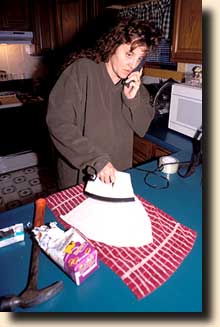 As to the first point, I found the childhood stories
incredibly different and yet very similar in their fundamental
features. Incest, mistreatment, lonesomeness, etc., were common, as I
expected. It is important to mention that none of the Klan members
even Pamela, who had been in therapy as a drug addict seemed to have
been doing any thinking on the connection between childhood abuse and
the fact that they were in the Klan. I mention this because criminals
are often very clever in finding excuses in their childhood stories
when under charges.
As to the first point, I found the childhood stories
incredibly different and yet very similar in their fundamental
features. Incest, mistreatment, lonesomeness, etc., were common, as I
expected. It is important to mention that none of the Klan members
even Pamela, who had been in therapy as a drug addict seemed to have
been doing any thinking on the connection between childhood abuse and
the fact that they were in the Klan. I mention this because criminals
are often very clever in finding excuses in their childhood stories
when under charges. 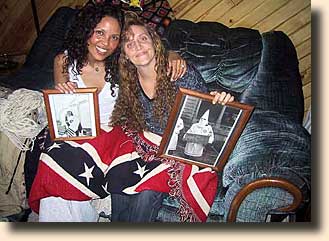
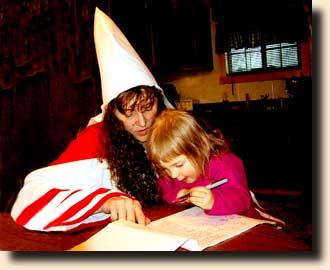
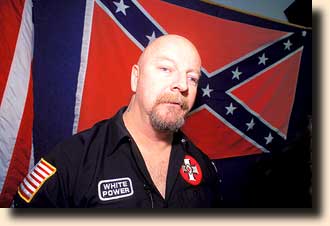
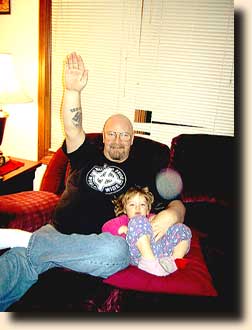 him. He was obviously more Nazi than KKK and
could not help but look like a "Dr. Strangelove" stretching his arm up
in a "Heil" all the time - although I quickly surmised that it was
something he did mainly to get my negative attention, to frighten me,
etc. I know from my dealings with so many ghetto criminals with a
similar pathology of "powerlessness trying to get a little power" that
the last thing I should give Wally was a sense of futile power by
seeing me scared. What he needed - and was obviously looking for
through this ridiculous behavior - was my attention, and through this
hopefully a little love. His anti-Semitic talk was part of that
subconscious scheme (but I did notice that it was all on a very
theoretic level, such as the classic Jewish conspiracies, rather than
having anything against Jews as people).
him. He was obviously more Nazi than KKK and
could not help but look like a "Dr. Strangelove" stretching his arm up
in a "Heil" all the time - although I quickly surmised that it was
something he did mainly to get my negative attention, to frighten me,
etc. I know from my dealings with so many ghetto criminals with a
similar pathology of "powerlessness trying to get a little power" that
the last thing I should give Wally was a sense of futile power by
seeing me scared. What he needed - and was obviously looking for
through this ridiculous behavior - was my attention, and through this
hopefully a little love. His anti-Semitic talk was part of that
subconscious scheme (but I did notice that it was all on a very
theoretic level, such as the classic Jewish conspiracies, rather than
having anything against Jews as people).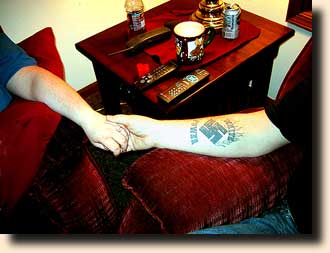
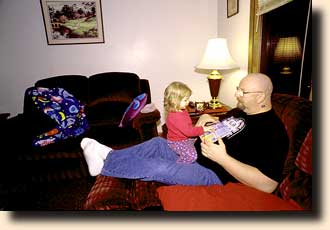
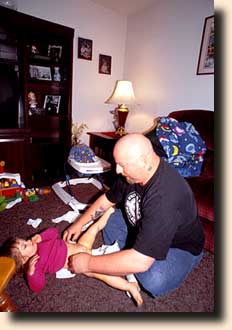 In my work in Europe I have always maintained that any
Nazi can be cured with a bit of love, or even if he could just find a
girlfriend. And this I also believe will be the case with Wally.
Because of his personal tragedy and due to his isolation, he is still
locked up in the rhetoric of his past - but this is obviously not his
life’s passion. What he burns for is evidently his family and to draw
from his deep love for it a family which had already managed to get
him from hell out into purgatory, from the Nazi party into the Ku Klux
Klan. I will bet that in a few years, with the help of Tania, he will
end up as quite an ordinary loving family father - especially if he
perceives a little love from us in his surroundings rather than our
hatred and condemnation. At least I do not see him as one bit worse
than all us Danes, who sit and think, talk or cast their votes in a
derogatory way when it comes to the Muslim immigrants or Danish-Muslim
families. Most importantly, Wally is not nearly as dangerous as the
Danes. For contrary to the Danes, Wally has no power to hurt others at
all.
In my work in Europe I have always maintained that any
Nazi can be cured with a bit of love, or even if he could just find a
girlfriend. And this I also believe will be the case with Wally.
Because of his personal tragedy and due to his isolation, he is still
locked up in the rhetoric of his past - but this is obviously not his
life’s passion. What he burns for is evidently his family and to draw
from his deep love for it a family which had already managed to get
him from hell out into purgatory, from the Nazi party into the Ku Klux
Klan. I will bet that in a few years, with the help of Tania, he will
end up as quite an ordinary loving family father - especially if he
perceives a little love from us in his surroundings rather than our
hatred and condemnation. At least I do not see him as one bit worse
than all us Danes, who sit and think, talk or cast their votes in a
derogatory way when it comes to the Muslim immigrants or Danish-Muslim
families. Most importantly, Wally is not nearly as dangerous as the
Danes. For contrary to the Danes, Wally has no power to hurt others at
all.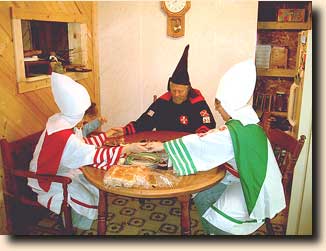
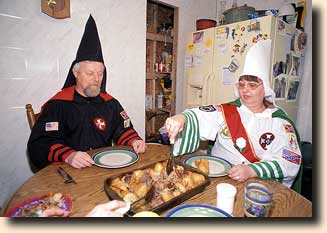
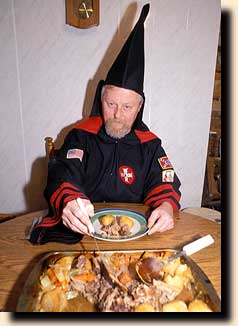 "And you were also yourself a "nigger" before you got
into the Klan?" I asked cocksure and quite a bit proud on the inside
because I now mastered their language so well that I barefacedly – in
the midst of a group of fully dressed Klan people – dared to call them
"niggers" right up in their open faces. Now we were really on speaking
terms with each other and the normally timid and closed Dennis reeled
off parrot-like all kinds of things about his life. Pamela had never
seen him so lively before as she did in this real man-to-man talk we
had there. He told me about the pride he got in his life when his wife
had been appointed to become a grand dragon. And about how proud he
had been when he himself for the first time in his life had been
appointed to anything of importance – that is to say, as body guard in
the Ku Klux Klan’s for the state’s highest office – his own wife. In
such a high office, he could certainly not feel as a "nigger" any
more, I was sadly thinking by myself while acknowledging how difficult
and painful life really is for some people.
"And you were also yourself a "nigger" before you got
into the Klan?" I asked cocksure and quite a bit proud on the inside
because I now mastered their language so well that I barefacedly – in
the midst of a group of fully dressed Klan people – dared to call them
"niggers" right up in their open faces. Now we were really on speaking
terms with each other and the normally timid and closed Dennis reeled
off parrot-like all kinds of things about his life. Pamela had never
seen him so lively before as she did in this real man-to-man talk we
had there. He told me about the pride he got in his life when his wife
had been appointed to become a grand dragon. And about how proud he
had been when he himself for the first time in his life had been
appointed to anything of importance – that is to say, as body guard in
the Ku Klux Klan’s for the state’s highest office – his own wife. In
such a high office, he could certainly not feel as a "nigger" any
more, I was sadly thinking by myself while acknowledging how difficult
and painful life really is for some people. 